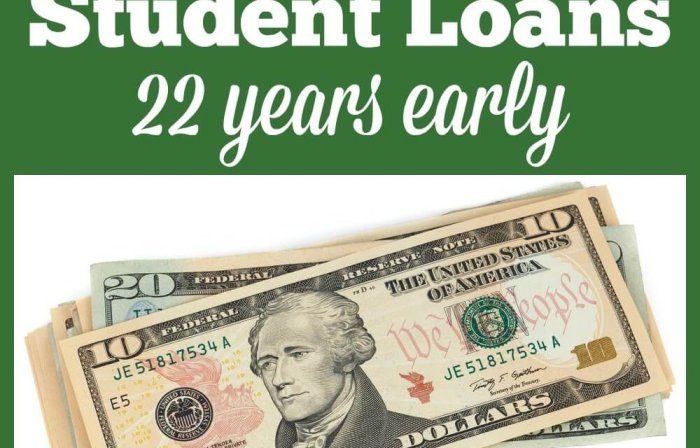
The question of whether paying off student loans early incurs penalties is a crucial one for borrowers seeking financial freedom. Understanding the nuances of federal versus private loans, and the potential impact on credit scores and taxes, is essential for making informed decisions. This exploration will delve into the complexities of early repayment, examining potential benefits and drawbacks across various loan types and financial scenarios.
This analysis will navigate the intricacies of different repayment plans, interest accrual, and prepayment policies offered by both federal and private lenders. We’ll also consider the often-overlooked aspects of how early repayment affects credit scores and tax implications, ultimately empowering you to make strategic choices aligned with your financial goals.
Federal Student Loan Repayment Penalties
There’s a common misconception that paying off federal student loans early incurs penalties. However, this isn’t generally true. The federal government doesn’t penalize borrowers for making extra payments or paying their loans off ahead of schedule. This means you can accelerate your repayment without facing financial repercussions from the loan servicer. However, the financial benefits of early repayment depend heavily on the specific repayment plan chosen.
Standard Federal Student Loan Repayment Plans and Interest Accrual
Several standard repayment plans are available for federal student loans, each impacting interest accrual differently. Understanding these differences is crucial for determining whether early repayment offers significant savings. The interest accrued on your loan directly impacts the total amount you repay.
The most common plans include:
* Standard Repayment Plan: This plan spreads payments over 10 years. Interest accrues throughout the loan term, and early repayment reduces the total interest paid.
* Graduated Repayment Plan: Payments start low and gradually increase over time. While initial payments are lower, the longer repayment period means more interest accrues overall. Early repayment is generally beneficial here, though the savings might be less pronounced compared to the Standard plan.
* Extended Repayment Plan: This plan stretches payments over a longer period (up to 25 years), resulting in lower monthly payments but significantly higher total interest paid. Early repayment is particularly advantageous with this plan due to the substantial interest savings.
* Income-Driven Repayment (IDR) Plans: These plans (such as ICR, PAYE, REPAYE, and IBR) base monthly payments on your income and family size. While monthly payments are lower, the repayment period can extend beyond 20 years, leading to higher total interest payments. Early repayment can be beneficial, but the savings may be less dramatic than with other plans due to the income-based adjustments.
Early Repayment: Financial Benefits and Drawbacks
Whether early repayment is financially beneficial or detrimental depends on several factors, including the chosen repayment plan, the interest rate, and the borrower’s overall financial situation. The potential for savings is directly related to the amount of interest accrued over the loan’s life.
| Repayment Plan | Interest Rate (Example) | Early Repayment Penalty | Potential Savings/Loss |
|---|---|---|---|
| Standard Repayment Plan | 6% | None | Significant savings due to reduced interest accrual. |
| Graduated Repayment Plan | 7% | None | Moderate savings, less than Standard plan due to longer repayment period. |
| Extended Repayment Plan | 8% | None | Substantial savings due to high interest accrual over a longer period. |
| Income-Driven Repayment Plan | 5% (variable) | None | Savings can vary significantly depending on income and repayment period; may be less than other plans. |
For example, a borrower with a $30,000 loan at 6% interest on a standard 10-year plan would pay approximately $3,800 in interest. Paying off the loan early would significantly reduce this interest expense. Conversely, a borrower on an income-driven plan with a longer repayment period might see less dramatic savings, even if they pay early, because the lower monthly payments mean more interest accrues overall.
Private Student Loan Repayment Penalties
Unlike federal student loans, private student loans often come with varying terms and conditions regarding early repayment. Understanding these terms is crucial for borrowers who wish to pay off their loans ahead of schedule, as doing so might not always be financially advantageous. While some lenders encourage early repayment, others may impose penalties.
Private lenders set their own policies regarding prepayment, resulting in a diverse range of practices across the industry. These policies can significantly impact a borrower’s overall loan repayment costs. It’s therefore essential to carefully review the loan agreement before signing to understand the specific terms and conditions related to prepayment.
Prepayment Penalties Imposed by Private Lenders
Private student loan lenders may include prepayment penalties in their loan agreements. These penalties can take several forms, impacting the borrower’s financial strategy. Common penalties include prepayment fees and changes to interest rates. A prepayment fee is a fixed amount charged for paying off the loan early, while a change in interest rate may involve a higher interest rate applied if the loan is paid off before a certain date. The existence and severity of these penalties vary considerably depending on the lender and the specific loan terms. For instance, a lender might charge a 1% prepayment penalty on the remaining loan balance, or they might increase the interest rate by 2% for the remainder of the loan term if paid early.
Variations in Prepayment Policies Across Private Lenders
The prepayment policies of private student loan lenders are not standardized. Borrowers should carefully examine their loan agreements to understand the specific terms. Some lenders may have no prepayment penalties, encouraging early repayment. Others may impose significant fees or interest rate adjustments. This lack of uniformity necessitates a thorough comparison of loan terms before choosing a lender.
- Prepayment Fees: Some lenders charge a flat fee or a percentage of the remaining loan balance upon early repayment.
- Interest Rate Changes: Certain lenders might increase the interest rate if the loan is repaid early. This is less common but can significantly impact the overall cost.
- No Prepayment Penalty: Some lenders offer loans with no penalty for early repayment, making it a financially attractive option for borrowers.
- Variable vs. Fixed Interest Rates: Loans with variable interest rates might have different prepayment penalty structures compared to those with fixed interest rates. The lender’s risk assessment influences these policies.
- Loan Term Length: The length of the loan term may influence the application of prepayment penalties. Shorter-term loans might have less stringent penalties.
Impact of Early Repayment on Credit Score

Paying off your student loans early might seem like a purely positive financial move, and in many ways it is. However, the impact on your credit score isn’t always straightforward. While the benefits of eliminating debt are substantial, the way early repayment affects your credit report requires careful consideration. This section explores the nuances of how early loan payoff interacts with credit scoring models.
Early repayment of student loans can influence your credit score in several ways, primarily through its effect on credit utilization and payment history. Credit utilization refers to the percentage of your available credit you’re currently using. Closing a student loan account reduces your available credit, which can temporarily affect your credit utilization ratio. Simultaneously, consistently making on-time payments on your student loans, regardless of repayment speed, positively impacts your payment history, a significant factor in credit scoring. The interplay of these two factors determines the ultimate effect on your score.
Credit Utilization and Early Repayment
Closing a student loan account removes the credit limit associated with that account from your credit report’s calculation of available credit. If you had a high credit limit on your student loans and paid them off early, your credit utilization ratio might temporarily increase if you don’t have other credit accounts with sufficient available credit to compensate. A higher credit utilization ratio can negatively impact your credit score, even if you have excellent payment history. For example, imagine someone with a $50,000 credit limit on their student loans and a $10,000 credit card limit. Paying off the student loans could significantly raise their credit utilization if they maintain a balance on their credit card. Conversely, if the individual had other significant credit lines open, the impact would be minimal.
Credit Score Impact of Early Repayment versus Consistent On-Time Payments
The impact of early repayment on your credit score is a complex interaction between factors. While consistently making on-time payments is generally beneficial, aggressively paying down debt and closing accounts can have short-term negative effects on your credit utilization ratio. A well-managed credit profile shows a consistent history of on-time payments and low credit utilization. While early repayment demonstrates financial responsibility, it doesn’t automatically translate to a higher score if it leads to a sudden increase in credit utilization. Ideally, a balanced approach involves maintaining a mix of credit accounts and keeping credit utilization low, even while strategically paying down high-interest debts like student loans.
The overall impact of early student loan repayment on credit scores is not uniformly positive. While eliminating debt is financially advantageous, it’s crucial to manage the potential temporary negative impact on credit utilization. The long-term benefits of a strong payment history often outweigh short-term fluctuations, but careful planning and a diversified credit profile can mitigate any negative effects.
Tax Implications of Early Repayment

Paying off your student loans early might seem like a purely beneficial financial move, but it’s crucial to consider the potential tax implications. The tax treatment of student loan payments can significantly impact your overall savings, particularly when factoring in loan forgiveness programs and your tax bracket. Understanding these nuances will help you make informed decisions about your repayment strategy.
Early repayment primarily affects the tax benefits associated with student loan interest. The IRS allows you to deduct the amount of interest you pay on eligible student loans, but only up to a certain limit and only if you meet specific requirements. This deduction can reduce your taxable income, resulting in lower tax liability. However, paying off your loan early means you’ll forgo the potential interest deduction in future years. Conversely, the principal portion of your student loan payment is not tax-deductible.
Tax Treatment of Interest and Principal Payments
The key difference lies in how the IRS treats interest versus principal payments. Interest paid on qualified student loans can be deducted, while principal payments are not tax deductible. This means that by paying down the principal early, you accelerate the repayment process but lose the opportunity to deduct future interest payments. This trade-off needs careful consideration, especially for taxpayers in higher tax brackets who would benefit more significantly from the interest deduction.
Tax Bracket Impact on Early Repayment
The financial impact of early repayment varies significantly depending on your tax bracket. Higher tax brackets generally benefit more from the student loan interest deduction. For example, someone in a higher bracket might save a larger amount of money through the deduction than the interest they would have saved by paying off the loan earlier. Conversely, those in lower tax brackets may see less benefit from the interest deduction, making early repayment a more financially attractive option. The following table illustrates this:
| Tax Bracket | Interest Deduction (Annual) | Principal Payment (Annual) | Net Tax Savings/Loss (Annual) |
|---|---|---|---|
| 12% | $1,000 | $2,000 | $120 (12% of $1000) |
| 22% | $1,000 | $2,000 | $220 (22% of $1000) |
| 32% | $1,000 | $2,000 | $320 (32% of $1000) |
*Note: This table presents a simplified example. Actual tax savings will vary based on individual circumstances and tax laws. The amounts for interest deduction and principal payments are illustrative and can change drastically based on loan amounts and repayment schedules.*
Loan Forgiveness Programs and Tax Implications
Certain loan forgiveness programs, like Public Service Loan Forgiveness (PSLF), can significantly impact your tax situation. While the forgiven amount might seem like a windfall, it is generally considered taxable income in the year it’s forgiven. This means you could face a substantial tax bill on the forgiven amount. This needs to be carefully considered when strategizing early repayment, as accelerating repayment could reduce the amount forgiven and thus lower your tax liability in the future, or conversely, paying off the loan early could remove the possibility of forgiveness altogether. Careful planning and consultation with a tax professional is highly recommended.
Financial Strategies for Early Repayment

Accelerating student loan repayment requires a proactive approach to budgeting and debt management. Several strategies can significantly reduce the overall time and cost associated with repaying these loans, ultimately leading to financial freedom sooner. These strategies involve careful planning, discipline, and a commitment to prioritizing debt reduction.
Budgeting Techniques for Accelerated Repayment
Effective budgeting is the cornerstone of early loan repayment. By meticulously tracking income and expenses, borrowers can identify areas where they can reduce spending and allocate more funds towards their student loans. This involves creating a detailed budget that categorizes all income sources and expenses, highlighting areas for potential savings. For example, reducing discretionary spending on entertainment, dining out, or subscriptions can free up significant funds for loan repayment. Utilizing budgeting apps or spreadsheets can greatly simplify this process and provide a clear picture of one’s financial situation. Furthermore, setting realistic financial goals, such as paying an extra $100 or $200 per month, can create a sense of accomplishment and motivation.
Debt Avalanche and Snowball Methods
Two popular debt repayment methods, the debt avalanche and debt snowball methods, can be employed to accelerate loan repayment. The debt avalanche method prioritizes paying off the loan with the highest interest rate first, minimizing the total interest paid over the life of the loans. This strategy is mathematically optimal, leading to the fastest reduction in overall debt. In contrast, the debt snowball method focuses on paying off the smallest loan first, regardless of interest rate. This approach offers a psychological advantage, providing a sense of quick wins and boosting motivation to continue the repayment process. The choice between these methods depends on individual preferences and financial goals. For instance, someone who prefers a quick sense of accomplishment might prefer the snowball method, while someone focused on minimizing long-term costs might choose the avalanche method.
Refinancing Options for Faster Repayment
Refinancing student loans involves replacing existing loans with a new loan from a different lender, often at a lower interest rate. This can significantly reduce monthly payments and accelerate repayment. However, it’s crucial to carefully compare offers from multiple lenders to secure the best possible terms.
Step-by-Step Guide to Refinancing
- Check your credit score: A higher credit score improves your chances of securing a favorable interest rate.
- Compare lender offers: Research different lenders and compare interest rates, fees, and repayment terms. Consider both fixed and variable interest rate options.
- Gather necessary documents: Prepare documents such as proof of income, employment history, and student loan details.
- Apply for refinancing: Complete the application process with your chosen lender, providing all required documentation.
- Review the loan agreement: Carefully review the terms and conditions of the new loan agreement before signing.
- Manage your new loan: Once approved, make timely payments to maintain a good credit history.
Refinancing can significantly shorten the repayment timeline and reduce the overall cost of borrowing. For example, refinancing a $50,000 loan from 7% to 4% interest could save thousands of dollars in interest over the life of the loan and potentially reduce the repayment period by several years. However, it is crucial to note that refinancing may not always be the best option. Borrowers should carefully consider the terms and conditions before making a decision.
Concluding Remarks
Ultimately, the decision of whether to pay off student loans early requires careful consideration of individual circumstances. While there are no inherent penalties with federal loans, the financial implications of various strategies, including the impact on credit scores and taxes, must be weighed. By understanding the potential benefits and drawbacks Artikeld here, borrowers can make informed decisions that optimize their financial well-being.
Helpful Answers
Can I refinance my student loans to pay them off faster?
Yes, refinancing can potentially lower your interest rate and shorten your repayment term, leading to faster payoff. However, it’s crucial to compare offers from multiple lenders and consider the potential loss of federal loan benefits.
Will paying off my student loans early improve my credit score significantly?
While it won’t directly boost your score, it reduces your credit utilization ratio and demonstrates responsible financial behavior, which can indirectly contribute to a better credit score over time. Consistent on-time payments are more crucial than early payoff for credit score health.
What if I have both federal and private student loans?
Prioritize paying down high-interest private loans first, as these typically don’t offer the same benefits as federal loans and may have prepayment penalties. Strategically allocating payments can significantly reduce overall interest paid.
Are there tax benefits to paying off student loan interest?
Yes, you may be able to deduct the interest you pay on student loans from your taxable income, subject to certain limitations. Consult a tax professional for personalized guidance.
